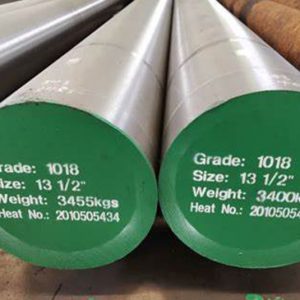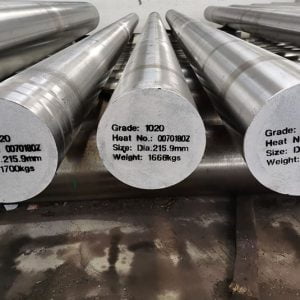Introduction
AISI 1018 steel is a widely used low-carbon steel known for its excellent machinability, weldability, and strength. It is one of the most common grades of steel used in various industries due to its balanced properties. This comprehensive guide will explore the properties, applications, benefits, and limitations of AISI 1018 steel, helping you understand why it is a preferred material in many manufacturing projects.
What is AISI 1018 Steel?

Definition and Composition
AISI 1018 steel is a low-carbon steel with a carbon content of approximately 0.18%. It also contains small amounts of manganese (0.60-0.90%) and trace amounts of other elements such as sulfur and phosphorus. This composition gives AISI 1018 steel its unique properties, making it suitable for a wide range of applications.
Key Properties of AISI 1018 Steel
- Low Carbon Content: Approximately 0.18%, which enhances its machinability and weldability.
- Manganese Content: 0.60-0.90%, which improves the steel’s strength and hardness.
- Tensile Strength: 440 MPa (min), which makes it suitable for structural applications.
- Yield Strength: 370 MPa (min), providing good strength for various applications.
- Elongation: 15-20%, which indicates good ductility.
Mechanical Properties of AISI 1018 Steel
Tensile Strength and Yield Strength
AISI 1018 steel exhibits a minimum tensile strength of 440 MPa and a minimum yield strength of 370 MPa. These properties make it suitable for applications requiring moderate strength and durability.
Hardness
The hardness of AISI 1018 steel ranges from 71 to 78 HRB (Rockwell B Hardness), making it a relatively soft steel. This property enhances its machinability, allowing it to be easily cut, drilled, and shaped.
Ductility
AISI 1018 steel has an elongation of 15-20%, indicating good ductility. This means it can be stretched or deformed without breaking, making it ideal for applications requiring bending or forming.
Toughness
The toughness of AISI 1018 steel is adequate for many applications, providing resistance to impact and shock loads. However, it is not as tough as higher carbon steels or alloy steels.
Table: Mechanical Properties of AISI 1018 Steel
| Property | Value |
|---|---|
| Tensile Strength | 440 MPa (min) |
| Yield Strength | 370 MPa (min) |
| Hardness | 71-78 HRB |
| Elongation | 15-20% |
| Density | 7.87 g/cm³ |
| Modulus of Elasticity | 205 GPa |
| Poisson’s Ratio | 0.29 |
Chemical Properties of AISI 1018 Steel
Carbon Content
The carbon content in AISI 1018 steel is approximately 0.18%, which categorizes it as a low-carbon steel. This low carbon content enhances its weldability and machinability, making it suitable for various applications.
Manganese Content
Manganese is present in AISI 1018 steel in amounts ranging from 0.60% to 0.90%. Manganese improves the steel’s hardenability and tensile strength while maintaining good ductility and toughness.
Sulfur and Phosphorus
AISI 1018 steel contains trace amounts of sulfur and phosphorus. Sulfur content is typically kept low to improve machinability, while phosphorus enhances the steel’s strength and corrosion resistance.
Applications of AISI 1018 Steel
Automotive Industry
In the automotive industry, AISI 1018 steel is commonly used for manufacturing components such as gears, shafts, pins, and rods. Its excellent machinability and weldability make it ideal for producing precise and reliable automotive parts.
Construction Industry
AISI 1018 steel is used in the construction industry for making structural components such as beams, columns, and fasteners. Its good strength and ductility allow it to withstand various loads and stresses encountered in construction projects.
Machinery and Equipment
In machinery and equipment manufacturing, AISI 1018 steel is used for making parts that require high machinability and moderate strength. Common applications include machine parts, axles, and spindles.
Home Appliances
AISI 1018 steel is also used in the production of home appliances such as refrigerators, washing machines, and ovens. Its versatility and cost-effectiveness make it a popular choice for manufacturing durable and reliable appliance components.
Tooling and Fixtures
Due to its machinability, AISI 1018 steel is often used for making tooling and fixtures. It can be easily shaped and formed into various tools, jigs, and fixtures used in manufacturing processes.
Benefits of Using AISI 1018 Steel
Excellent Machinability
One of the main benefits of AISI 1018 steel is its excellent machinability. The low carbon content allows the steel to be easily cut, drilled, and shaped, making it ideal for applications requiring precision machining.
Good Weldability
AISI 1018 steel offers good weldability, allowing it to be easily welded using standard welding techniques. This makes it suitable for applications where welding is required, such as structural components and automotive parts.
Versatility
The versatility of AISI 1018 steel makes it suitable for a wide range of applications across various industries. Its balanced properties of strength, ductility, and machinability allow it to be used in many different products and components.
Cost-Effectiveness
AISI 1018 steel is a cost-effective material, offering good performance at a reasonable price. This makes it an attractive choice for manufacturers looking to balance quality and cost in their products.
Consistent Quality
AISI 1018 steel is known for its consistent quality, ensuring reliable performance in various applications. The standardized composition and properties make it a dependable material for manufacturing.
Limitations of AISI 1018 Steel

Limited Hardness
While AISI 1018 steel offers good machinability, its low hardness limits its use in applications requiring high wear resistance. For such applications, higher carbon or alloy steels may be more suitable.
Moderate Strength
Although AISI 1018 steel provides adequate strength for many applications, it may not be suitable for high-stress or heavy-duty applications where higher strength is required.
Corrosion Resistance
AISI 1018 steel has limited corrosion resistance compared to stainless steels. It may require protective coatings or treatments to prevent rust and corrosion in certain environments.
Conclusion
AISI 1018 steel is a versatile and widely used material known for its excellent machinability, good weldability, and balanced properties. It is suitable for various applications across multiple industries, including automotive, construction, machinery, home appliances, and tooling. While it has some limitations, such as limited hardness and moderate strength, its benefits make it an attractive choice for many manufacturing projects. By understanding the properties and applications of AISI 1018 steel, manufacturers can make informed decisions and select the right material for their needs.
FAQ
What is AISI 1018 steel used for?
AISI 1018 steel is used in various applications, including automotive components, structural parts, machinery and equipment, home appliances, and tooling. Its excellent machinability and weldability make it suitable for a wide range of products.
What are the main properties of AISI 1018 steel?
The main properties of AISI 1018 steel include low carbon content (0.18%), good machinability, good weldability, moderate tensile and yield strength, and adequate ductility. These properties make it a versatile and cost-effective material.
How does AISI 1018 steel compare to other carbon steels?
AISI 1018 steel is a low-carbon steel with good machinability and weldability, making it suitable for many applications. Compared to higher carbon steels, it has lower hardness and strength but offers better ductility and ease of machining.
Can 1018 steel be heat treated?
Yes, 1018 steel can be heat treated to improve its mechanical properties. Common heat treatment processes include annealing, quenching, and tempering. However, its low carbon content limits the extent of hardening achievable.
Is 1018 steel corrosion-resistant?
1018 steel has limited corrosion resistance compared to stainless steels. It may require protective coatings or treatments, such as painting or galvanizing, to prevent rust and corrosion in certain environments.





